“We live in a world of freedom,” proclaimed one prelate, so Christian tradition “must prove itself today”
By Cameron Doody (NovenaNews.com)
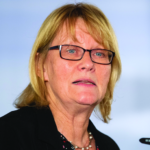
Deputy Chair Karin Kortmann of the Central Committee of German Catholics
No to “clericalism” and yes to greater “co-responsibility” and participation on the part of lay people in the Church: those were the key ideas in the first assembly on the German synodal path which took place the weekend of February 1 in Frankfurt.
After the first assembly of the German synodal path — the two-year reform process on power, women, sexual morality and the priesthood — German Bishops’ president Cardinal Reinhard Marx declared, “I am feeling confident.”
Deputy Chair Karin Kortmann of the Central Committee of German Catholics (ZdK), and assembly co-president with Cardinal Marx and Thomas Sternberg, lauded the “hierarchy-free space” that opened up in Frankfurt, while Deputy Chairman of the Bishops’ Conference and Bishop of Osnabrück Franz-Josef Bode called the meeting a “great future workshop.”
In the course of the assembly discussions, Bode had proposed that in the future there be in the Church “two distinct forms” of priesthood, “celibacy and non-celibacy.”
In that context, the expression “married priesthood as a prophetic figure” came up multiple times.
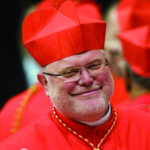
German Bishops’ president Cardinal Reinhard Marx
“The discussions and encounters are characterized by an intense spiritual atmosphere and the search for God’s will,” said Bishop Franz-Josef Overbeck of Essen on February 1, adding later that “the debates were based on mutual respect and showed impressively how much we live in a world of freedom,” and that it is on that possibility of freedom that the message of the Bible and tradition “must prove itself today.”
The work of the assembly over the three days made it clear “that the participants agree on the basic values of the Catholic Church, but also that these values are lived in very different conditions today,” Overbeck said.
For his part, Bishop Georg Bätzing of Limburg told the Frankfurter Allgemeine Zeitung that in the discussions “I felt a lot of energy” and the build-up of pressure for change “on the issues of power and separation of powers and on the role of women in the Church.”
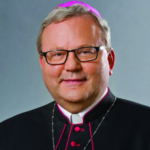
Deputy Chairman of the Bishops’ Conference and Bishop of Osnabrück FranzJosef Bode.
“We need greater participation by all members of the Church in the decisionmaking processes,” said Bishop Karl-Heinz Wiesemann of Speyer.
He insisted that that participation in responsibility should extend especially to “women participat[ing] accordingly at all management levels that are currently possible” under present Church law.
Theologian Agnes Wuckelt, the vice-chair of the Catholic Women’s Association of Germany (KFD), proposed on the margins of the assembly a three-step process for achieving women’s equality in the Church.
First of all, Wuckelt said, more women must be placed in management positions and given opportunities for directing churches and celebrating church services.
Next, the German bishops should ask Rome about opportunities for the female diaconate.
The final step in the process would be a vote of the synodal assembly that “at the level of the world Church” — that is, at a Church Council — “the theological arguments for and against the priestly ordination of women…be gathered and examined.”
Wuckelt’s proposal came after a joint position paper put out by the major Catholic women’s associations in Germany, Switzerland and Italy on the occasion of the first meeting of the German synodal path, in which the women’s rights groups insisted that “we believe that people are the image of God.”
“That is why women and men have the same dignity and the same rights. Because of gender, there must be no ecclesiastical or social disadvantage. Therefore women and men must have equal access to all ministries and offices in the Church,” the women’s associations argued.
A Note of Discord
But if that great push for women’s equality was considered the highlight of the first assembly of the German synodal path — along with the admission on the assembly floor of the Archbishop of Hamburg, Stefan Hesse, that the Church’s teaching on homosexuality is “hurtful and discouraging” and must be changed — the perceived “lowlight” was the continued skepticism of Cardinal Rainer Maria Woelki of Cologne.
“My great concern that, due to the way this event was conceived and constituted, a Protestant church parliament is being implemented here, so to speak, has proved to be justified,” Woelki said.
That comment elicited the rebuke of German Bishops’ president Cardinal Marx, and others, to the effect that “I don’t know why Protestant should be a dirty word.”
“Do you want synodality, as the Pope always demands, or do you want an old model of Church organization from the 19th century?” president Sternberg of the ZdK shot back at Woelki.
Also firing back at Woelki was the chairman of the Diocesan Council of Catholics in the cardinal’s own diocese of Cologne, Tim Kurzbach, who said he feared that “Woelki destroys the authority of his episcopal office by not trying to convince with good arguments in the assembly, but by being indignant about the fact that he does not have more power resulting from his office.”
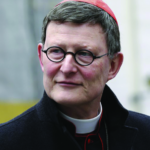
Cardinal Rainer Maria Woelki of Cologne
“Yet he should have recognized long ago that position alone no longer creates true authority,” Kurzbach added.
Other memorable addresses in the first assembly of the German synodal path came from two young people present at the event: Mara Klein and Janosch Roggel.
Klein denounced the clergy sex abuse and cover-up which were the impetus for the organization of the synodal path, to clear the Church of those factors that facilitate a culture of abuse and secrecy.
Telling bishops that they “are not the victims” but in actual fact an “association of perpetrators,” Klein reflected on the fact that a bishop present at the meeting, Rudolf Voderholzer of Regensburg, said — much for the same reasons asWoelki — that the whole idea of a “synodal path” made him “uncomfortable.”
“I hope that we do feel uncomfortable,” Klein said.
“I am against a polarization of clergy and laity, but I want to emphasize that we are dealing here with a massive structural sin. Show us that you can break out of it. I’m still standing here, and it’s hard for me, because I believe that we can break out of it,” Klein thundered from the synod floor.
Roggel, for his part, took the floor and declared, “I am a transsexual. And abuse by a priest was the worst thing I have ever experienced.”
Roggel’s words led to a round of applause and standing ovations.
German Cardinal Müller under fire
Attacked after he compares the bishops’ “synodal path” to Nazi-era law
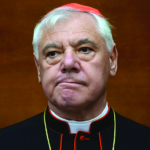
Cardinal Gerhard Ludwig Müller
Criticism of remarks by Cardinal Gerhard Ludwig Müller comparing the Church reform dialogue underway in Germany with events in Nazi Germany erupted on February 5, with Wuerzburg Bishop Franz Jung saying the comments were “very out of place.” He pointed out that the Synodal Path was based on resolutions of the German Bishops’ Conference: “So then you must also stand by them.”
Meanwhile the highest Catholic laypeople’s group in Germany, the Central Committee of German Catholics (ZdK), also criticized the comments by Cardinal Müller, the former prefect of the Congregation for the Doctrine of the Faith in the Vatican. ZdK president Thomas Sternberg told Germany’s Catholic News Agency (KNA): “There is criticism that disqualifies itself. It is so removed from everyday life that it cannot be taken seriously.”
Müller had drawn parallels between last weekend’s Synodal Path decision-making processes in Frankfurt and the so-called Enabling Act of the German Reichstag parliament of 1933.
“In a suicidal process, the majority decided that their decisions are valid even if they contradict Catholic doctrine,” Müller told the Canadian portal LifeSiteNews.
“This is like the situation when the Weimar Constitution was repealed by the Enabling Act. A self-appointed assembly, which is not authorized by God nor by the people it is supposed to represent, rescinds the Constitution of the Church of Divine Right, which is based on the Word of God (in Scripture and Tradition),” added the cardinal, who confirmed his LifeSiteNews comments to KNA.
His political reference was to the Enabling Act of March 24, 1933 when the duly-elected Reichstag gave sweeping powers to the government of Adolf Hitler, allowing it to enact laws without the approval of the Reichstag. (KNA)






Facebook Comments